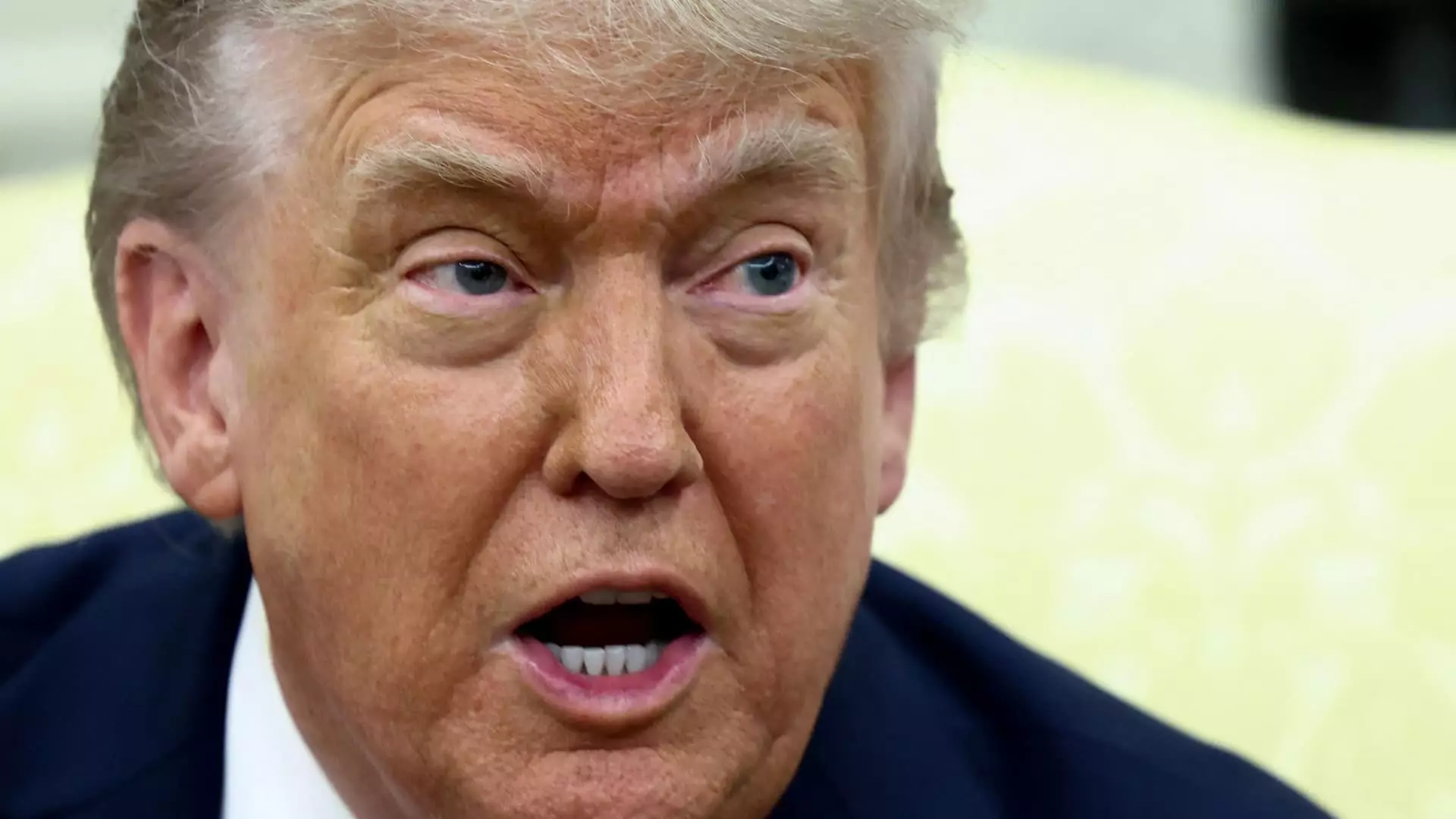In the tumultuous arena of American politics and business, few clashes capture the public eye more than President Donald Trump and Tesla’s Elon Musk. The recent spat between these two heavyweights spotlights not only the fraught relationship between corporate moguls and government but also the intricate dance of public policy and economic incentives. As both figures wield considerable influence—Trump as the former leader of the free world and Musk as a driving force behind electric vehicles (EVs) and space exploration—their disagreements resonate beyond personal vitriol and enter the larger discourse on tax legislation and green energy.
Trump’s assertion that Musk’s criticisms stem from his dissatisfaction with the axing of electric vehicle incentives reflects a fundamental misunderstanding of the complexities surrounding renewable energy initiatives. While the elimination of these credits may indeed concern Musk—who benefits both financially and ideologically from government support for EVs—it’s disheartening to witness Trump dismiss Musk’s critiques as mere petulance. Instead, these exchanges should galvanize a serious dialogue about how sustainable transportation can flourish amid an even larger fiscal picture.
The Disgusting Abomination: Musk’s Charge
Musk’s vehement label of Trump’s tax bill as a “disgusting abomination” reveals the depth of frustration many feel towards legislative measures that do not align with the pressing realities of climate change and the urgent need for a green transition. For far too long, the political elite have waxed poetic about supporting renewable energy while simultaneously slashing funding and hindering necessary incentives. This bipartisan, pig-headed affinity for fossil fuel subsidies, unchallenged by the current landscape of climate urgency, renders the tax bill utterly hypocritical.
Musk’s call for the elimination of what he termed “the mountain of disgusting pork” reveals a broader sentiment that resonates with many taxpayers: an instinctual repulsion towards the wasteful expenditure of taxpayer dollars on projects that barely serve the public good. Rather than indulging in a petty tit-for-tat, Musk’s challenge raises essential questions about legislative accountability and fiscal responsibility. Should we not expect our representatives to revitalize the economy while mindfully investing in sustainable growth rather than catering to outdated lobbying interests?
The Role of Wealth and Influence
What complicates this discussion is the intricate web of influence that both Musk and Trump embody. Musk, despite his vast wealth, is a subject of public scrutiny due to his philanthropic efforts, including his support for eco-friendly innovation. Furthermore, he is not merely an executive but an emblem of modern ingenuity. Contrastingly, Trump’s financial contributions to the political realm have often come under fire; his interactions with both financial backers and policymakers signal a prioritization of profit over progressive policy.
As Trump vocally stands behind taxpayers while selectively backing specific projects, the question arises: are we truly supporting the advancement of technologies that protect the environment, or merely creating a façade of progress that doesn’t level the playing field for visionary leaders in the industry? The interplay between politics and private enterprise, as demonstrated in Musk’s critique of Trump’s financial initiatives, underscores the perils of wealth wielding power over public policy without accountability.
The Democrats and NASA: A Missed Opportunity?
In the political horns of conflict, Trump’s rejection of Jared Issacman as NASA’s set-of-the-highest-profile appointments not only highlights partisan oversight but also hints at a greater narrative of opportunity lost. By alienating capable individuals based on party affiliation, we risk stifling innovation and the crossover of ideas necessary for advancing key federal missions, such as space exploration and climate resilience.
As Trump noted, “NASA is very important.” Yet, what is becoming increasingly evident is that importance is not merely aligned with allegiance to ideology; it requires a committed, expert approach to executing the agency’s ambitious goals. Elitism in the political framework drags progress into stagnation, leaving enterprises like SpaceX battling uphill challenges while simultaneously addressing the hullabaloo of political drama flooding into their operational environments.
A Future in Peril
Musk’s frustrations are well-founded, yet they also echo a growing unease among citizens disillusioned with the bureaucratic muck that hampers progress in a climate-challenged world. The convenience of ignoring worthy voices—whether they originate from industry leaders or motivated socio-political activists—will ultimately be the Achilles’ heel of modern governance.
As the stakes continue to rise in the electric vehicle sector, it is imperative that we critically reassess legislation not just as a framework for taxes but as a blueprint for a thriving, sustainable future. The age of catering to the whims of political gamesmanship must give way to a genuine effort to align interests—to craft policies that reflect the energy of our time, galvanizing the talents of visionaries like Musk and others dedicated to a better, greener tomorrow. The real question remains: who will rise to meet this crucial moral imperative?


Leave a Reply